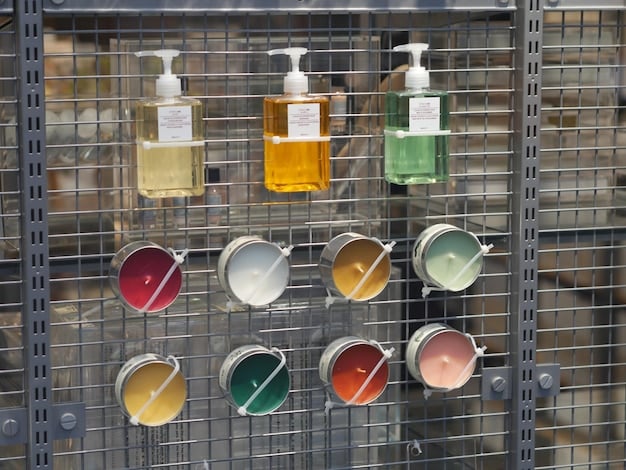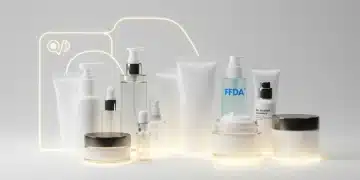Acne-Fighting Arsenal: Your Routine for Clear, Healthy Skin

Acne-Fighting Arsenal: A Skincare Routine That Clears Breakouts and Prevents Future Flare-Ups hinges on carefully selected products and consistent application to address acne causes, reduce inflammation, and promote skin healing, leading to a clearer and healthier complexion.
Battling breakouts and dreaming of clear skin? Your Acne-Fighting Arsenal: A Skincare Routine That Clears Breakouts and Prevents Future Flare-Ups starts here. Let’s dive into the essentials for a complexion you’ll love.
Understanding Acne: The First Step to Clear Skin
Before building your acne-fighting skincare routine, it’s essential to understand what causes acne. Acne isn’t just a cosmetic issue; it’s a skin condition influenced by various factors.
Understanding what triggers your acne can help you tailor a routine that effectively addresses your skin’s specific needs. Let’s explore some of the key factors that contribute to acne development.
Key Factors Contributing to Acne
Acne development is a multifaceted issue. Several factors work together to create the perfect environment for breakouts to occur. Here are some of the main factors:
- Excess Sebum Production: Overactive sebaceous glands produce too much oil, leading to clogged pores.
- Clogged Pores: Dead skin cells and oil accumulate in pores, forming blackheads and whiteheads.
- Bacteria: Propionibacterium acnes (P. acnes) bacteria thrives in clogged pores, causing inflammation.
- Inflammation: The body’s immune response to bacteria leads to redness, swelling, and painful pimples.
Hormonal fluctuations, genetics, diet, and stress can also play significant roles in acne development. By addressing these factors, you can create a skincare routine that targets the root causes of your acne and prevents future flare-ups.

Building Your Acne-Fighting Skincare Routine
Now that you understand the causes of acne, it’s time to build your acne-fighting skincare routine. The key is consistency and choosing products with ingredients that target acne-causing factors.
A well-structured routine will address excess sebum, clogged pores, bacteria, and inflammation. Let’s break down the essential steps.
Essential Steps for Clear Skin
An effective acne-fighting skincare routine typically includes these key steps. Adapt the products, consistency to your personal needs.
- Cleansing: Use a gentle, non-comedogenic cleanser to remove dirt, oil, and makeup without stripping the skin.
- Exfoliating: Incorporate a chemical exfoliant (like AHA/BHA) to unclog pores and remove dead skin cells.
- Treating: Apply targeted treatments with active ingredients like benzoyl peroxide or salicylic acid to kill bacteria and reduce inflammation.
- Moisturizing: Hydrate the skin with a non-comedogenic moisturizer to maintain balance and prevent dryness.
- Sun Protection: Protect the skin from sun damage with a broad-spectrum SPF 30 or higher, which is essential to prevent post-inflammatory hyperpigmentation (PIH).
Remember to be patient and consistent with your routine. It can take several weeks to see noticeable improvements. Avoid picking or squeezing pimples, as this can worsen inflammation and lead to scarring.
The Power of Active Ingredients
Active ingredients are the superheroes of your acne-fighting skincare routine. Ingredients like salicylic acid, benzoyl peroxide, and retinoids can significantly improve your skin.
Understanding how these ingredients work helps you prioritize and make informed product choices. Let’s explore some of the most effective active ingredients in acne treatment.
Key Active Ingredients
- Salicylic Acid: A beta-hydroxy acid (BHA) that exfoliates the skin, unclogs pores, and reduces inflammation.
- Benzoyl Peroxide: An antibacterial agent that kills P. acnes bacteria and reduces inflammation.
- Retinoids: Vitamin A derivatives that promote cell turnover, prevent clogged pores, and reduce inflammation.
- Azelaic Acid: An ingredient that reduces inflammation, kills bacteria, and lightens hyperpigmentation.
When introducing new active ingredients, start slowly and gradually increase frequency to avoid irritation. Patch-test new products to ensure you don’t have an allergic reaction. Consulting with a dermatologist can provide personalized recommendations tailored to your skin type and acne severity.
Morning vs. Night Routine: Tailoring Your Approach
Structuring your skincare routine differently for morning and night can optimize the benefits of each product. Your morning routine should focus on protection, while your night routine focuses on repair and treatment.
This tailored approach maximizes the effectiveness of your acne-fighting arsenal. Let’s break down what each routine should entail.
Crafting Your AM/PM Skincare Plan
Knowing when to use different products can significantly impact their effectiveness. Here’s a suggested breakdown:
- Morning Routine:
- Gentle Cleanser
- Antioxidant Serum (e.g., Vitamin C)
- Lightweight, Non-Comedogenic Moisturizer
- Broad-Spectrum SPF 30+
- Night Routine:
- Double Cleanse (Oil cleanser followed by gentle cleanser)
- Exfoliating Treatment (AHA/BHA) – 2-3 times a week
- Acne Treatment (Benzoyl Peroxide or Retinoid)
- Hydrating, Non-Comedogenic Moisturizer
Avoid using too many active ingredients at once, as this can lead to irritation. Alternate between treatments on different nights or use them on alternating days. Monitoring how your skin responds and adjusting accordingly is essential for a successful routine.

Lifestyle Factors: Supporting Your Skincare Routine
While a targeted skincare routine is crucial, lifestyle factors also play a significant role in managing acne. Diet, stress, sleep, and hydration can significantly impact your skin’s health.
Incorporating healthy lifestyle habits can complement your skincare routine and improve your overall complexion. Let’s explore these factors in more detail.
Lifestyle Tweaks for Clearer Skin
Making a few simple changes to your daily habits can enhance the effectiveness of your skincare routine. These changes can help reduce inflammation, balance hormones, and promote healthier skin.
- Diet: Limit processed foods, sugary drinks, and dairy, which can trigger inflammation and breakouts. Focus on whole foods, fruits, vegetables, and lean protein.
- Stress Management: Practice stress-reducing activities like yoga, meditation, or deep breathing exercises to lower cortisol levels, which can contribute to acne.
- Sleep: Aim for 7-9 hours of quality sleep per night to allow your skin to repair and regenerate.
- Hydration: Drink plenty of water throughout the day to keep your skin hydrated and support overall health.
Wearing breathable fabrics, washing your pillowcases regularly, and avoiding touching your face can also help minimize acne flare-ups. Small lifestyle adjustments can make a big difference in your skin’s health.
Preventing Future Flare-Ups: Long-Term Strategies
Once you’ve achieved clear skin, the next step is preventing future flare-ups. Consistency, maintenance, and awareness of potential triggers are key to long-term success.
Adopting a proactive approach will help you keep acne at bay and maintain a healthy, radiant complexion. Let’s discuss some strategies for preventing future breakouts.
Maintaining Clear Skin
Sustaining your results requires a consistent and mindful approach to skincare. Keep applying the essentials and avoid some old habits.
- Maintain a Consistent Routine: Stick to your established skincare routine, even when your skin is clear, to prevent future breakouts.
- Adjust Your Routine as Needed: Be prepared to adjust your routine based on changes in your skin, environment, or lifestyle.
- Avoid Over-Exfoliating: Exfoliate regularly, but avoid overdoing it, as this can irritate and damage your skin.
- Be Mindful of Potential Triggers: Identify and avoid potential triggers like certain foods, skincare products, or stress factors.
Regular check-ins with a dermatologist can also help you stay on track and address any emerging skin concerns. A long-term commitment to your skincare and lifestyle habits is essential for maintaining clear, healthy skin.
| Key Point | Brief Description |
|---|---|
| 🧼 Gentle Cleansing | Use a non-comedogenic cleanser to remove dirt and prevents clogged pores. |
| 🧪 Active Ingredients | Salicylic acid and benzoyl peroxide fight acne-causing bacteria and inflammation. |
| ☀️ Daily SPF | Protect skin from sun damage, preventing post-inflammatory hyperpigmentation (PIH). |
| 💧 Hydration and Diet | Drink water daily and follow anti-inflammatory diets for healthy and clear skin results. |
Frequently Asked Questions
▼
Exfoliate 2-3 times a week to remove dead skin cells and unclog pores. Avoid over-exfoliating, which can cause irritation, so monitor your skin’s reaction carefully.
▼
Yes, certain foods can affect acne. Limit processed foods, sugary drinks, and dairy. Focus on whole foods, fruits, vegetables, and lean proteins in your regular diet.
▼
Reduce the frequency of active ingredients. Use a soothing moisturizer. If irritation persists, consult a dermatologist. Staying on top of your reactions is vital.
▼
Start with a low concentration and use it every other day. If irritation occurs, reduce frequency. Daily use can be possible, but monitor your skin’s reaction closely.
▼
It can take 6-8 weeks to see noticeable improvements. Consistency is key. Continue your routine even when you don’t see immediate changes. Patience and perseverance pay off.
Conclusion
Building an effective acne-fighting arsenal: a skincare routine that clears breakouts and prevents future flare-ups involves understanding the causes of acne, incorporating active ingredients, tailoring your routine, and adopting healthy lifestyle habits for clear and healthy skin.





